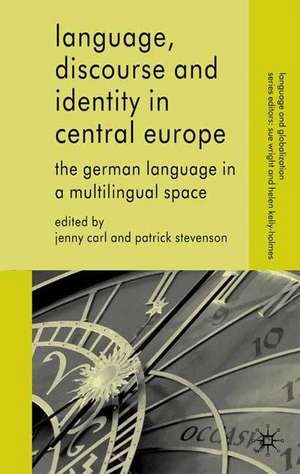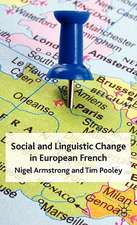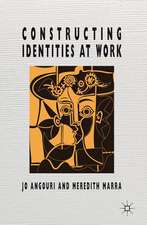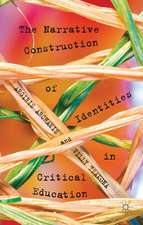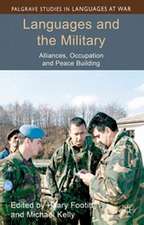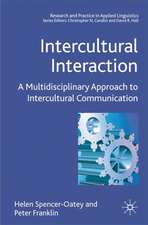Language, Discourse and Identity in Central Europe: The German Language in a Multilingual Space: Language and Globalization
Editat de J. Carl, P. Stevensonen Limba Engleză Hardback – 30 apr 2009
Din seria Language and Globalization
- 17%
 Preț: 525.22 lei
Preț: 525.22 lei - 15%
 Preț: 643.84 lei
Preț: 643.84 lei -
 Preț: 383.93 lei
Preț: 383.93 lei - 18%
 Preț: 731.91 lei
Preț: 731.91 lei - 15%
 Preț: 638.11 lei
Preț: 638.11 lei - 15%
 Preț: 642.51 lei
Preț: 642.51 lei - 18%
 Preț: 727.18 lei
Preț: 727.18 lei - 15%
 Preț: 641.71 lei
Preț: 641.71 lei -
 Preț: 385.84 lei
Preț: 385.84 lei -
 Preț: 396.62 lei
Preț: 396.62 lei - 15%
 Preț: 646.62 lei
Preț: 646.62 lei - 15%
 Preț: 644.95 lei
Preț: 644.95 lei - 15%
 Preț: 635.15 lei
Preț: 635.15 lei - 15%
 Preț: 640.06 lei
Preț: 640.06 lei -
 Preț: 385.25 lei
Preț: 385.25 lei - 15%
 Preț: 702.87 lei
Preț: 702.87 lei -
 Preț: 389.70 lei
Preț: 389.70 lei -
 Preț: 386.22 lei
Preț: 386.22 lei - 15%
 Preț: 696.50 lei
Preț: 696.50 lei - 15%
 Preț: 701.25 lei
Preț: 701.25 lei - 15%
 Preț: 640.71 lei
Preț: 640.71 lei - 15%
 Preț: 696.82 lei
Preț: 696.82 lei - 18%
 Preț: 946.87 lei
Preț: 946.87 lei -
 Preț: 392.60 lei
Preț: 392.60 lei -
 Preț: 384.86 lei
Preț: 384.86 lei -
 Preț: 382.36 lei
Preț: 382.36 lei -
 Preț: 383.93 lei
Preț: 383.93 lei - 15%
 Preț: 641.71 lei
Preț: 641.71 lei - 15%
 Preț: 638.43 lei
Preț: 638.43 lei - 15%
 Preț: 647.40 lei
Preț: 647.40 lei -
 Preț: 388.52 lei
Preț: 388.52 lei -
 Preț: 388.13 lei
Preț: 388.13 lei - 15%
 Preț: 640.88 lei
Preț: 640.88 lei
Preț: 389.70 lei
Nou
Puncte Express: 585
Preț estimativ în valută:
74.57€ • 78.06$ • 61.70£
74.57€ • 78.06$ • 61.70£
Carte tipărită la comandă
Livrare economică 05-19 aprilie
Preluare comenzi: 021 569.72.76
Specificații
ISBN-13: 9780230224353
ISBN-10: 0230224350
Pagini: 268
Ilustrații: XV, 268 p.
Dimensiuni: 140 x 216 x 20 mm
Greutate: 0.45 kg
Ediția:2009
Editura: Palgrave Macmillan UK
Colecția Palgrave Macmillan
Seria Language and Globalization
Locul publicării:London, United Kingdom
ISBN-10: 0230224350
Pagini: 268
Ilustrații: XV, 268 p.
Dimensiuni: 140 x 216 x 20 mm
Greutate: 0.45 kg
Ediția:2009
Editura: Palgrave Macmillan UK
Colecția Palgrave Macmillan
Seria Language and Globalization
Locul publicării:London, United Kingdom
Cuprins
List of Tables and Figures Acknowledgements Notes on Contributors Introduction: Central Europe as a Multilingual Space; J.Carl & P.Stevenson PART I: LANGUAGE AND EUROPEAN IDENTITIES: CENTRE AND PERIPHERY Discourses about Enlarged and Multilingual Europe: Perspectives from German and Polish National Public Spheres; M.Krzy?anowski PART II: BORDER CROSSINGS The German Language in Poland: The Eternal Foe and the Wars on Words; S.Jaworska 'Die Härteste Sprachgrenze Europas?' Negotiating the Linguistic Divide in Theatres on the German-Polish Border; J.Wilkinson Czech-German Relationships and Identity in a Cross-Border Region; K.?erna Czech, German and English: Finding Their Place in Multinational Companies in the Czech Republic; J.Nekvapil & T.Sherman PART III: MIGRATIONS PAST AND PRESENT Changes in the Linguistic Marketplace: The Case of German in Hungary; P.Maitz & K.Sándor Central European Time: Memories of Language – Lost and Found – In the Life Stories of German-Speakers; J.Carl & P.Stevenson Dialect Use and Discursive Identities of Migrants from the West in Eastern Germany; J.Dailey-O'Cain & G.Liebscher ¿Hablemos El Mismo Idioma? Salsa, Multilingualism and National Monolingual Ideology; B.Schneider Towards a Multinational Concept of Culture: Romanian German Literature in Romanian and Hungarian Literature; T.Cooper PART IV: LANGUAGE AND EUROPEAN IDENTITIES: PERIPHERY AND CENTRE Revisiting History: The 2007 European Capital of Culture and the Integration of Fractal Europe; K.Horner Index
Recenzii
'The linguistic landscape of Central Europe in the nineteenth and twentieth centuries consists of a complex web of protecting and oppressing minority languages, creating and abolishing nation states and national languages, and shifting political and linguistic borders and boundaries to expand some territories and to render invisible others. This fascinating volumes contains some 12 chapters each dealing with case studies on the use of language(s) in the creation of community and individual identity, drawing on evidence from language contact situations which go beyond the typical textbook accounts of, say, German linguistic enclaves in Hungary. Instead, studies of new areas such as the use of German as a foreign language in Poland, German immigrant literature in Romania and German theatre in Poland, as well as the language of business communication in international companies in the Czech Republic, provide a real advancement for our understanding of multinational space(s). At a time when Europe is still dominated by the tension between monolingual nation states and a recent openness and acceptance that minority and regional communities (and their languages) deserve proper recognition, including e.g. the drive to a greater EU whilst at the same time strengthening (or even creating) regions, this book offers genuine insights into the complexities of the political, cultural, and educational importance of language for the identity of the citizens of Central Europe. This book shows a deep understanding of the historical issues, covers a broad range of case studies from leading European researchers, and addresses the questions of today by offering answers which will still be important tomorrow.' - Nils Langer, Reader in German Linguistics, University of Bristol, UK
'This impressively wide-ranging and well-informed study presents up-to-date perspectives on matters of significance not only for linguists...but also for scholars with a more general interest in multilingual policy in the European Union.' - Slovo A Slovesnost, Czech Republic
'This impressively wide-ranging and well-informed study presents up-to-date perspectives on matters of significance not only for linguists...but also for scholars with a more general interest in multilingual policy in the European Union.' - Slovo A Slovesnost, Czech Republic
Notă biografică
KATE?INA ?ERNÁ Doctoral Candidate, Department of General Linguistics, Faculty of Philosophy and Arts, Charles University, Prague, Czech RepublicTHOMAS COOPER is currently teaching as Associate Professor at the Károly Eszterházy University, HungaryJENNIFER DAILEY-O'CAIN Associate Professor of German Applied Linguistics, University of Alberta, Edmonton, CanadaKRISTINE HORNER Lecturer in German and Sociolinguistics, School of Modern Languages and Cultures, University of Leeds, UKSYLVIA JAWORSKA Language Studies Coordinator in German at Queen Mary College, University of London, UKMICHAL KRZY?ANOWSKI Senior Research Fellow, Department of Linguistics, Lancaster University, UK and Assistant Professor, School of English, Adam Mickiewicz University, PolandGRIT LIEBSCHER Associate Professor of German at the University of Waterloo in CanadaPÉTER MAITZ Assistant Professor at the German Department of the University of Debrecen, HungaryJI?Í NEKVAPIL Associate Professor of Linguistics, Department of General Linguistics, Charles University, Prague, Czech RepublicKLÁRA SÁNDOR Professor of Linguistics, University of Szeged, Hungary, and a member of the Hungarian National AssemblyBRITTA SCHNEIDER Research Assistant, Department of Linguistics, University of Frankfurt, GermanyTAMAH SHERMAN Post-doctoral Researcher in the Department of General Linguistics, Charles University, Prague, Czech RepublicJANE WILKINSON Lecturer in German, University of Leeds, UK
